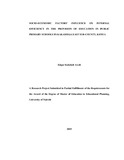| dc.description.abstract | The study sought to investigate the socio-economic factors’ influence on internal
efficiency in the provision of education in public primary schools in Kakamega
East Sub-County, Kenya. The study was guided by the following objectives; to
determine the influence of parental level of education on internal efficiency in the
provision of education, to establish the effect of family structure on internal
efficiency in the provision of education, to examine influence of parental income
levels on internal efficiency in the provision of education and to establish the
influence of pupils’ engagement in household duties on internal efficiency in the
provision of education in public primary schools. The study employed a
descriptive survey research design and 86 public primary schools in Kakamega
East Sub-County, 86 head teachers, 1008 teachers, 3336 standard eight pupils.
The responses from the 26 head teachers interviewed, 75 teachers and 260 pupils
filling of questionnaires were insightful and elaborated issues in the literature
reviewed. The results from the field highlighted the following points; schools’
internal efficiency is influenced by the learning during learners’ school age
attendance compared to the resources provided. The percentage of the pupils
completing school is often used as (its) measure. Internal efficiency of an
education system is revealed by the promotion, repetition and dropout rates. The
study findings indicated that parents’ level of income was low due to the fact that
majority of the pupils parents were unemployed. Majority of the teachers
indicated that low parental levels of education causes pupils drop out due to the
negative attitudes hence pupils’ low academic progress either, leads to repetition
or drop out which affects the completion rates. Family structure has been found to
be a major factor that influences inefficiency in schools because children from
single parent household are mainly poor hence unable to pay fees. It was found
that household duties affects internal efficiency because pupils are forced to be
out of school to attend to household duties and lack concentration due to fatigue
associated to household chores. The poverty in the area should be addressed by
the community with the assistance of the government for the parents to have
reliable sources of income to economically support their children in school. | en_US |

